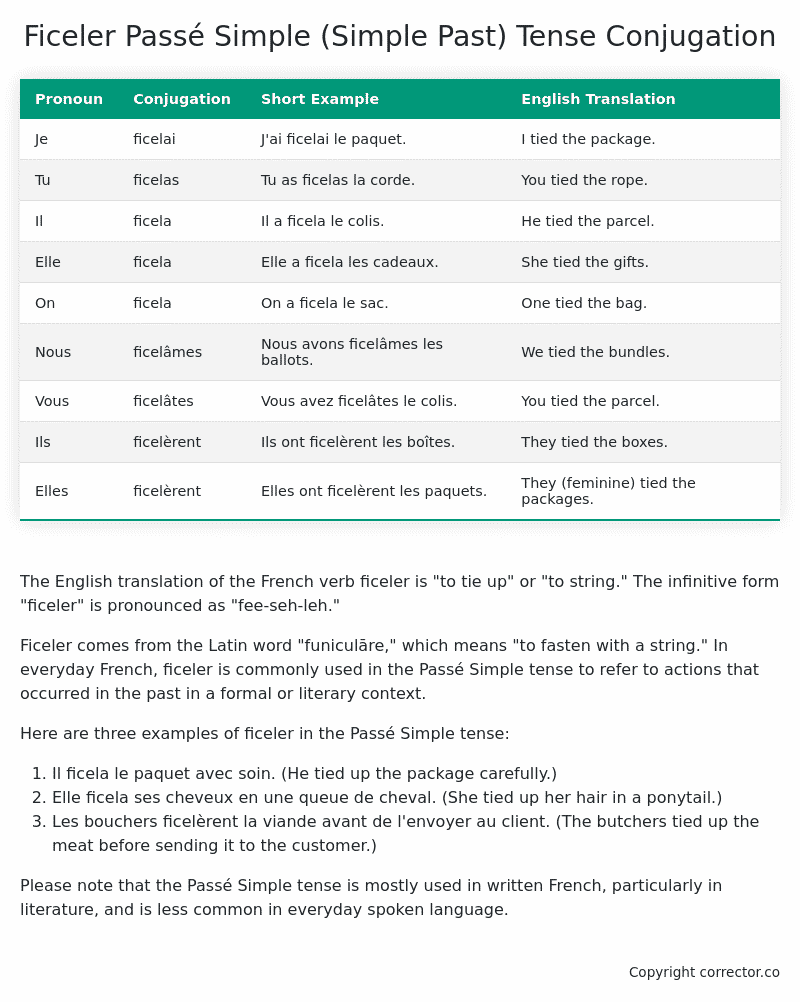Passé Simple (Simple Past) Tense Conjugation of the French Verb ficeler
Introduction to the verb ficeler
The English translation of the French verb ficeler is “to tie up” or “to string.” The infinitive form “ficeler” is pronounced as “fee-seh-leh.”
Ficeler comes from the Latin word “funiculāre,” which means “to fasten with a string.” In everyday French, ficeler is commonly used in the Passé Simple tense to refer to actions that occurred in the past in a formal or literary context.
Here are three examples of ficeler in the Passé Simple tense:
- Il ficela le paquet avec soin. (He tied up the package carefully.)
- Elle ficela ses cheveux en une queue de cheval. (She tied up her hair in a ponytail.)
- Les bouchers ficelèrent la viande avant de l’envoyer au client. (The butchers tied up the meat before sending it to the customer.)
Please note that the Passé Simple tense is mostly used in written French, particularly in literature, and is less common in everyday spoken language.
Table of the Passé Simple (Simple Past) Tense Conjugation of ficeler
| Pronoun | Conjugation | Short Example | English Translation |
|---|---|---|---|
| Je | ficelai | J’ai ficelai le paquet. | I tied the package. |
| Tu | ficelas | Tu as ficelas la corde. | You tied the rope. |
| Il | ficela | Il a ficela le colis. | He tied the parcel. |
| Elle | ficela | Elle a ficela les cadeaux. | She tied the gifts. |
| On | ficela | On a ficela le sac. | One tied the bag. |
| Nous | ficelâmes | Nous avons ficelâmes les ballots. | We tied the bundles. |
| Vous | ficelâtes | Vous avez ficelâtes le colis. | You tied the parcel. |
| Ils | ficelèrent | Ils ont ficelèrent les boîtes. | They tied the boxes. |
| Elles | ficelèrent | Elles ont ficelèrent les paquets. | They (feminine) tied the packages. |
Other Conjugations for Ficeler.
Le Present (Present Tense) Conjugation of the French Verb ficeler
Imparfait (Imperfect) Tense Conjugation of the French Verb ficeler
Passé Simple (Simple Past) Tense Conjugation of the French Verb ficeler (You’re reading it right now!)
Passé Composé (Present Perfect) Tense Conjugation of the French Verb ficeler
Futur Simple (Simple Future) Tense Conjugation of the French Verb ficeler
Futur Proche (Near Future) Tense Conjugation of the French Verb ficeler
Plus-que-parfait (Pluperfect) Tense Conjugation of the French Verb ficeler
Passé Antérieur (Past Anterior) Tense Conjugation of the French Verb ficeler
Futur Antérieur (Future Anterior) Tense Conjugation of the French Verb ficeler
Subjonctif Présent (Subjunctive Present) Tense Conjugation of the French Verb ficeler
Subjonctif Passé (Subjunctive Past) Tense Conjugation of the French Verb ficeler
Subjonctif Imparfait (Subjunctive Imperfect) Tense Conjugation of the French Verb ficeler
Subjonctif Plus-que-parfait (Subjunctive Pluperfect) Tense Conjugation of the French Verb ficeler
Conditionnel Présent (Conditional Present) Tense Conjugation of the French Verb ficeler
Conditionnel Passé (Conditional Past) Tense Conjugation of the French Verb ficeler
Conditionnel Passé II (Conditional Past II) Tense Conjugation of the French Verb ficeler
L’impératif Présent (Imperative Present) Tense Conjugation of the French Verb ficeler
L’impératif Passé (Imperative Past) Tense Conjugation of the French Verb ficeler
L’infinitif Présent (Infinitive Present) Tense Conjugation of the French Verb ficeler
L’infinitif Passé (Infinitive Past) Tense Conjugation of the French Verb ficeler
Le Participe Présent (Present Participle) Tense Conjugation of the French Verb ficeler
Le Participe Passé (Past Participle) Tense Conjugation of the French Verb ficeler
Struggling with French verbs or the language in general? Why not use our free French Grammar Checker – no registration required!
Get a FREE Download Study Sheet of this Conjugation 🔥
Simply right click the image below, click “save image” and get your free reference for the ficeler Passé Simple tense conjugation!

Ficeler – About the French Passé Simple (Simple Past) Tense
Formation
Usage
Narration
Historical Context
Interactions with other tenses
Passé Composé
Imparfait
Conditional and Subjunctive
Summary
I hope you enjoyed this article on the verb ficeler. Still in a learning mood? Check out another TOTALLY random French verb conjugation!


